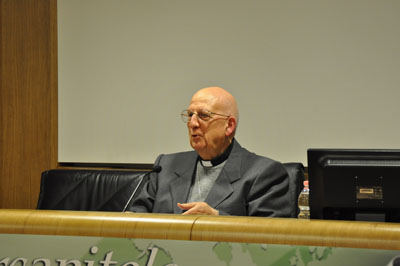At the beginning of the “programming stage” of our meeting, Fr. Bartolomeo Sorge, sj, offered us a profound and challenging reflection on the theme: Imbued with the Word, we trace out paths of hope. Fr. Sorge’s presence among us is always a great gift because he has a very clear grasp of our Pauline mission and spirituality and has been accompanying our journey for years with his illuminating input at important congregational events.
Today, he said, human beings in every part of the world are distrustful and confused, anxiously asking themselves: “Where are we going? What will tomorrow be like? What should we do?” In the face of this bewilderment, Fr. Sorge immediately proposes the “great hope” that is Christ Jesus, quoting an excerpt from the Gospel of John: “Light shines in the darkness, and the darkness cannot overpower it” (1:5). He then invited us to not be afraid because the light [of Christ] can never be extinguished by darkness.
What is the hope that can conquer all our fears? In his encyclical Spes Salvi, Pope Benedict XVI says that the Word of God tells us that human life does not end in emptiness but that we are destined for God; that we were created “to be filled with him” (n. 33). This certitude, which springs from faith in the divine Word, gives meaning to our life and sustains us in even the most difficult circumstances: those who are imbued with the Word are transformed by it and are able transform others; they are freed by it and are able to free others.
Fr. Sorge said that the theme of our Interchapter was a very timely one in that it could help us find ways to better integrate our life and mission so as to proclaim and witness to this “great hope.” The first step toward realizing this goal is to make a personal, concrete synthesis between the Word and our life. By doing so, we can become “bridges of hope” in the digital world and carry out a journey characterized by dialogue–a journey that can bring about a meeting between human hopes and Christian hope in keeping with the horizons opened by Vatican Council II.
Fr. Sorge ended his talk by inviting us to re-examine our ways of carrying out the apostolate in the light of the “Gospel of hope.” It is this Gospel that we must proclaim to a world in desperate need of a “hope that will not disappoint.”
We are sure that the next guest speaker on our agenda, Bishop Domenico Pompili, Director of the National Communications Office of the Italian Bishops Conference, will offer us further enlightenment on this subject.
